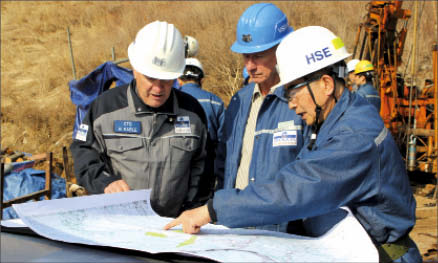With tungsten prices on the rise, Vancouver-based Woulfe Mining (WOF-V) is scrambling to restart the past-producing Sangdong tungsten-molybdenum mine in South Korea by late 2012.
The price of the strategic metal spiked this year, as demand grew and as China cut its export quotas. China produces more than 80% of the global tungsten supply, which is used in various applications from high-tech electronics to the space industry.
The price for ammonium paratungstate (APT) in July was US$450 per metric tonne (mtu), a 30% increase from the start of the year, and almost double the average for 2010, according to Roskill.
The London-based research group says APT prices are expected to remain high in 2012, and onwards, until considerable tungsten output is available from new projects.
“There are very few big projects like ours that are close to production,” Woulfe’s CEO and president Brian Wesson said at a recent presentation in Toronto. “That’s what is important. That is why we are pushing to get into the market in 2012.”
Situated 170 km southeast of Seoul, Sangdong was one of the world’s largest tungsten mines. The mine ran for 40 years before closing in 1992, after APT prices plunged to US$40 per mtu as a result of China washing the market with cheap tungsten.
With mining approvals in hand, along with a revised capital cost and enhanced resources for the project, Woulfe is itching to start building the mine by year end. By then it expects to have received construction approval and have finished a feasibility study. Currently, a pre-feasibility study is underway at Sangdong. Results are anticipated in September.
In late July, Woulfe cut the project’s capital cost estimate compared to last year’s scoping study. Costs were reduced to US$135 million from US$289 million, after it recruited design engineers from Indonesia-based PT Contromation Energy Services to compute a new price tag.
The updated cost includes building a 1.2-million-tonne-per-year processing plant and a bulk underground drift, as well as developing the top quarter of the deposit.
Woulfe notes that a revised July 18 resource statement evaluating the mine’s upper section suggests there is enough indicated resources to initially process 400,000 mtu of APT and 500,000 lbs. molybdenum a year for five years.
Indicated resources in the upper section of the Hangingwall, Main and Footwall zones total 5.9 million tonnes averaging 0.42% tungsten oxide and 0.04% molybdenum disulphide.
Sangdong has another 18.5 million tonnes in inferred at similar tungsten and moly grades.
Wesson says the company is working on converting the resources into reserves and aims to have 10 million tonnes in reserves by year end.
The new capital cost is lower than the scoping study’s because “it’s a whole new plan with ventilation via existing incline shaft,” the company outlined in a recent press release. It notes that most of the mining would be done above the valley floor with minimal dewatering required of the old mine.
The scoping study completed last March by Wardrop was based solely on inferred resources within the Footwall zone. It envisioned a 2.5-million tonne-per-year processing plant and mine, based on an APT price of US$250 per mtu. Capital costs were anticipated at US$289 million, with a 3.4-year payback.
Woulfe says that cost assumed building a ring road to mine the footwall at depth and constructing two ventilation shafts. It points out the study was done before the company reopened the underground mine and developed a detailed model of the mine.
“The study assumed we hadn’t been underground, hadn’t done any drilling,” explains Wesson. “It looked at the project as almost a greenfield mine.
“But when we got underground and found there was enough ore above the valley floor, we reworked the capital. And with our guys in Indonesia, we came up with a figure.”
When asked how the company will finance US$135 million, Wesson simply says “you’re looking at a capital cost of less than our yearly gross cost.”
The scoping study showed Sangdong with a 15-year life, had a pre-tax net present value of US$462 million, at an 8% discount, and a 26.4% internal rate of return.
But with higher APT prices, Wesson says he’s not worried about how the company will secure capital.
He adds that Woulfe is in talks with Korea Bank and potential offtake partners. Currently, the company’s major shareholders include Colonial Bank of Australia (13.8%) and Korea Zinc (12.5%).
Wesson says the project, along with having a transport advantage of being close to markets both in Japan and China, has the support of the Korean government. The government offers all foreign companies five years of tax exemptions, no royalties, or export tax. After the tax incentives, the corporate tax rate is 20%.
The region is also safe and well developed and attractive to work in, Wesson candidly explains after the presentation to a few lingering attendees.
“You drive down (to the project) and you can stop and have an Americano and a hotdog on the way. You never get food poisoning. You don’t have mosquitoes eating you. You don’t have the government trying to steal things.”
However, he cautions if you’re not within the perimeters of a running or past-producing mine, it’s very hard to do exploration in the country.
“You don’t go out in the bush there and think you are going to build a mine” because people in Korea “are all nature lovers, reforesting the whole country,” says Wesson.
“If we go drill a hole, we would have to put the tree back… you wouldn’t do exploration there.”
Along with Sangdong, the company is advancing the Muguk gold-silver project, which was formerly Korea’s largest gold mine.
At presstime, Woulfe shares were at 24.5¢, within a 52-week trading range of 9¢-55¢.


Be the first to comment on "Woulfe advances Sangdong"